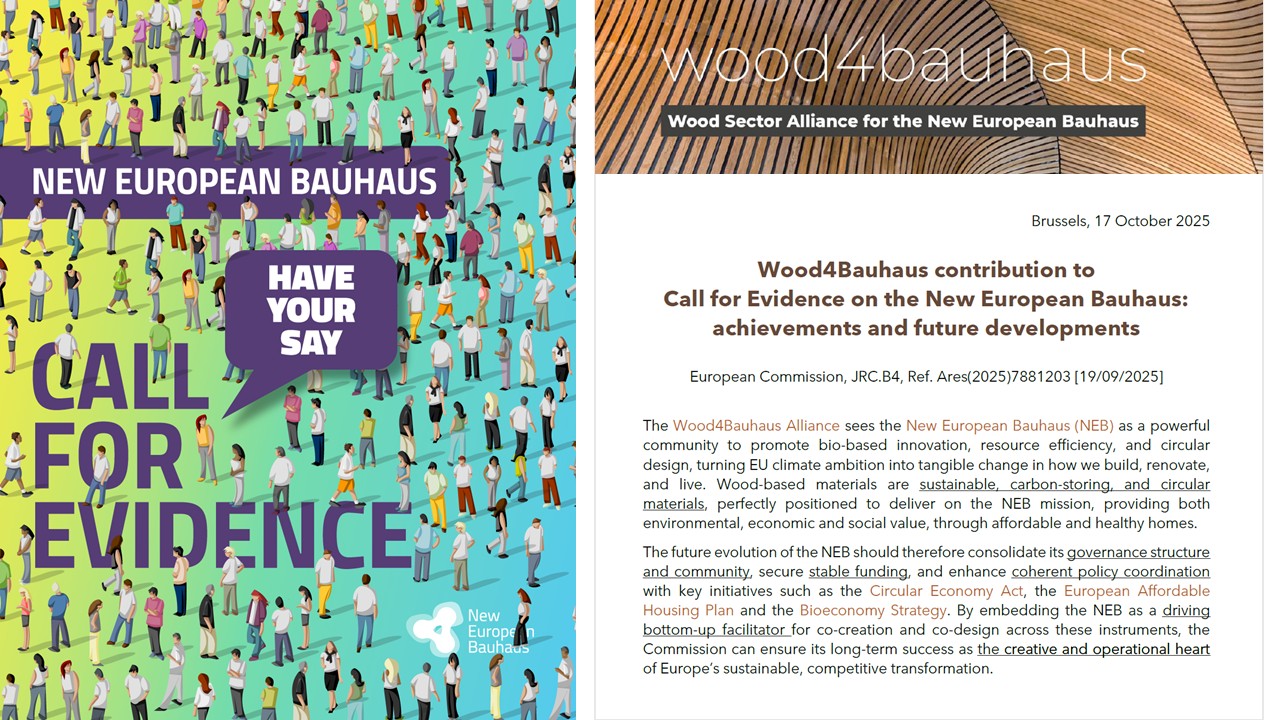Wood4Bauhaus contribution to Call for Evidence on the New European Bauhaus
The European Commission launched a call for evidence on how to strengthen the New European Bauhaus (NEB). Wood4Bauhaus has responded with an own letter pointing out eight important recommendations.

Picture credits: © European Commission, Wood4Bauhaus Alliance, 2025
The Wood4Bauhaus Alliance sees the New European Bauhaus (NEB) as a powerful community to promote bio-based innovation, resource efficiency, and circular design, turning EU climate ambition into tangible change in how we build, renovate, and live. Wood-based materials are sustainable, carbon-storing, and circular materials, perfectly positioned to deliver on the NEB mission, providing both environmental, economic and social value, through affordable and healthy homes.
The future evolution of the NEB should therefore consolidate its governance structure and community, secure stable funding, and enhance coherent policy coordination with key initiatives such as the Circular Economy Act, the European Affordable Housing Plan and the Bioeconomy Strategy. By embedding the NEB as a driving bottom-up facilitator for co-creation and co-design across these instruments, the Commission can ensure its long-term success as the creative and operational heart of Europe’s sustainable, competitive transformation.
Wood-based solutions and bio-based materials embody the NEB principles of sustainability, aesthetics, and inclusion by translating them into climate-positive, circular, and human-centred design solutions that are essential to guide and lead Europe’s green transformation and make the NEB vision tangible: sustainable, affordable, and beautiful living spaces for everyone.
In this respect, the Wood4Bauhaus Alliance reaffirms the central role of the wood sector in driving Europe’s transformation: With 17.5 million jobs linked to regional value chains, the wood sector is vital for both rural and urban economies and boosts a strong innovation ecosystem that drives competitiveness and higher productivity in construction, leading the digital green transition in the building sector.
Timber buildings are also showcases of long-term carbon sinks that boost health and wellbeing and are thus key to providing better housing and simultaneously cutting carbon emissions. The European wood sector is a global leader in resilient growth of innovative SMEs from domestic forest resources. It can scale up significantly through coherent policy support to deliver on the transition goals for the built environment.
Wood4Bauhaus proposes eight key recommendations in the following topical areas for the future development of the NEB:
- Harnessing bio-based materials
- Industrialised & off-site construction
- Circular economy & recycling
- Public procurement & regulatory alignment
- Skills & workforce development
- Community & inclusiveness
- Research, innovation & monitoring
- Policy coherence with housing initiatives
Find here the full letter with the detailed recommendations (PDF):
Read | Download | DOI
In conclusion, Wood4Bauhaus is convinced that the NEB has the potential to transform how Europe builds, renovates, and lives bridging climate ambition with human creativity and comfort. By embracing bio-based and circular materials, supporting industrialised construction, and strengthening skills and local engagement, the NEB can demonstrate how Europe’s Green Deal becomes tangible for people in everyday life.
Wood-based materials provide practical, scalable solutions to achieve this vision. Wood4Bauhaus therefore urges the European Commission to anchor circularity, resource efficiency, cascading use, carbon storage, and inclusiveness at the core of the NEB’s next phase turning the movement into a long-term framework for sustainable prosperity and cultural renewal across Europe.
Find here the EC NEB Call for Evidence page with the stakeholder feedback received (88 in total).